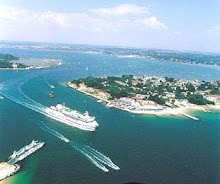Saturday, 14 January 2012
Who’s afeard?
So, on this bitterly cold January night, we head back to the heights of Durlston Castle where the jet black sky is packed with enough stars to put the Cornish firmament to shame. Light and traffic pollution is non-existent up on this cliff-top. The only sound comes from the waves beating on the shore far below where bottle-nosed dolphins swim silently in the freezing winter sea. Time and tide wait for no man although, inside the castle, they wait for us; the late arrivals to a hidden performance by the folk group of the same name. In the middle of nowhere, I spy the welcome and unexpected surprise of missing friends from the past, also gathered to listen to the songs and tales of long-gone Dorset sea-dogs and smugglers. The yellow standard with the red-edged, white cross is draped to the fore.
Here am I, bold Jack, just lately come from cruising now the wars are o’er.
No, it’s not the man-child returned from distant climes but another Jack who took the King’s shilling to escape a cruel, apprenticeship. With his buttons shining, he preferred the battlegrounds of the Napoleonic wars to rural hardship. Jack’s mother had to be propped against the stone walls of the cottage, her jelly-legs having given way on first sight of her son after twelve despairing years. His boots were, at last, back on beloved Dorset clay despite his infirm and speechless father having mourned his son’s presumed death.
While the battle rages loud and long, the stormy winds do blow
Sailors, enlisted and pressed, fought the elements along our otherwise tranquil Dorset coastline. In 1786, two hundred and forty men and women fell from the East Indiaman, the Halsewell, into treacherous waters off Worth Matravers. Alongside most of the crew, the women drowned, weighed down by their skirts and petticoats. Above, the quarrymen, alerted to the wreck, hauled seventy-four souls up the cliff to safety.
We’re raking the moon, sirs, for the girt smiling cheeses lie there in the pool
And only tonight did I learn what a Moonraker was. The line from the song refers to the answer that smugglers gave to excise men on being asked what they were doing with their poles in the water. Simple Dorset folk, who thought the moon’s reflection on the sea was a round yellow cheese, were playing the simpleton’s role. In truth, they were searching for fine cognac and other contraband purposely disposed of near the coast.
But the boats are coming through the night
It doesn’t end in the distant past, boys. There are enough stories of the bravery of lifeboat men to make you want to give them all your money. I’m amazed the RNLI fundraisers don’t cotton on to their emotive history more proficiently. And, of course, there’s June, 1944. If you think sea-dogs and shanties were lost in the seas of the very distant past, think again. The little boats of Dorset sailed bravely to the shores of Dunkirk whilst, later, the bigger ones left Poole to land on the beaches of Normandy. Our songs tonight told tales of those who were aboard on their first voyage. Who’s afeard?
Subscribe to:
Post Comments (Atom)




No comments:
Post a Comment
If you can work out how to leave a comment you are a genius